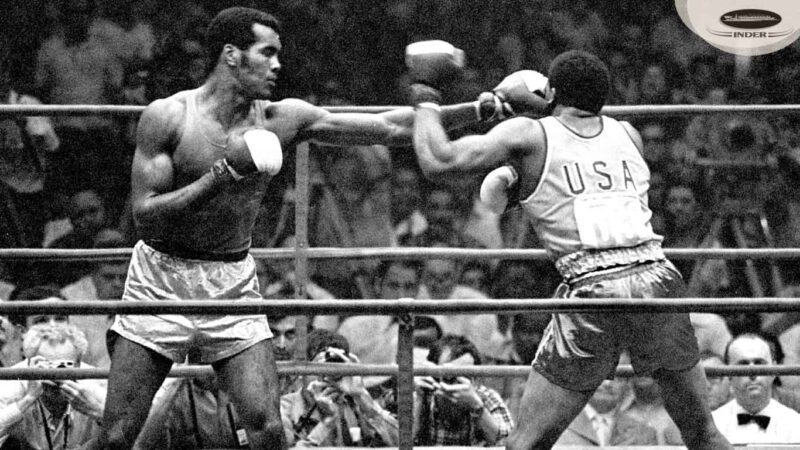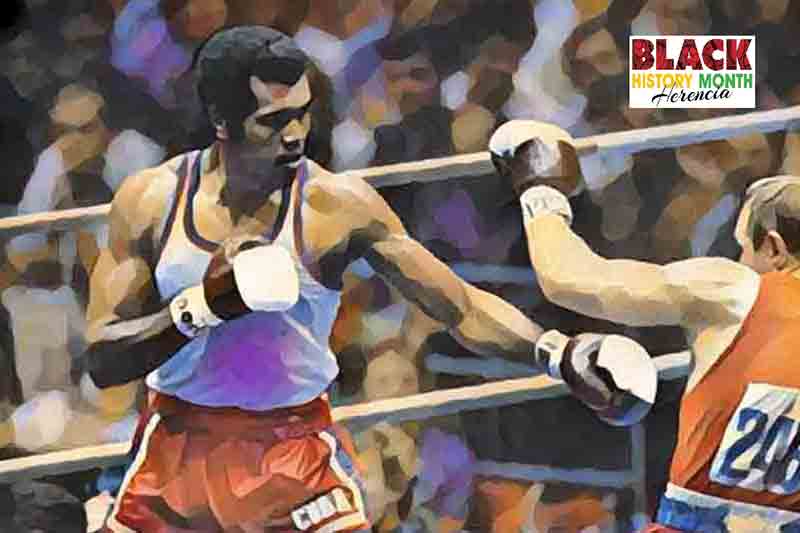This article was originally published in February 2022 as part of a project to celebrate the legacy and valuable contribution of Afro-Latino athletes for Black History Month. Today, we repost it following the same purpose.
A boxer elevated to national hero, a Cuban who in his country stood to the right of Zeus on Mount Olympus. Teofilo Stevenson Lawrence, the ebony legend of the ring, is one of the greatest figures ever in the Olympic sport of boxing. Embodying humility and respect, he conquered the hearts of his people and the imagination of fans around the world. We celebrate this legendary pugilist during Black History Month.
Teofilo was born in Las Tunas, Cuba into a poor family. His father, Teófilo Stevenson Parsons, was a guajiro (peasant) cane farmer from San Vicente. His mother, Dolores Lawrence, was the daughter of immigrants from St. Kitts Island and also worked in the fields.
As a child, Stevenson was always at odds with others, so brandishing his fists to defend himself was something inherent in him. Fortunately, he went to John Herrera, a former Cuban heavyweight champion, who began training the quarrelsome youngster.
Shortly after, in 1966, he began his career in boxing, but the early results were not favorable, as he racked up on losses against much more experienced fighters. Determined, he did however continue to polish his technique and in 1969, when he was 17 years old, took second place in the National Championships, and was selected to train with Olympic coaches Andrei Chervonenko and Alcides Segarra.
Stevenson begins his ascent to Olympus
Teofilo trained extensively with a hunger to learn, and the long hours in the gym paid off immediately. In 1970, in Havana, the young boxer knocked out Nancio Carrillo, who in those years dominated the heavyweight division in Cuba, also knocking out Juan Perez another top heavyweight, securing him a place on the Cuban national team.

His first Olympic Games were in Munich 1972 and he soon made the weight of his fists felt. He knocked out American Duane Bobick in the quarterfinals, while scoring an easy TKO against Germany’s Peter Hussing, and took the gold medal without a fight because the other finalist Romanian Ion Alexe, sustained an injury before the bout.
After his performance in the Olympics, he received several offers to defect from the Cuban national team to face Joe Frazier for the World Heavyweight Championship, after Frazier had defeated Muhammed Ali. There was talk of a million-dollar purse, but Teofilo was blunt:
“I prefer the affection of eight million Cubans, and I would not exchange my piece of Cuba for all the money they can offer me.”
His legend began to be forged. Montreal 1976 was his second Olympic engagement. Stevenson was 24 years old and in his best shape. He knocked out American John Tate in the semifinals. Tate would later win the WBA World Heavyweight title as a professional.
Stevenson then faced Romania’s Mircea Simon, whom he also sent to sleep for his second Olympic gold. He appeared to be unstoppable.

Ali vs. Stevenson never materialized
After the Montreal gold medal, Stevenson was in the sights of many promoters, who wanted to see the Cuban turn professional and secure a fight against Muhammad Ali, pitting the best Olympic fighter on the planet against the king of the professional Heavyweights, a dream match.
In 1977, the Cuban Boxing Federation proposed to the International Amateur Boxing Association (AIBA) and the World Boxing Council (WBC) that a series of fights between Stevenson and Ali take place in the United States and under certain conditions that both the WBC and AIBA rejected.
In 1978, during a tournament in New York, boxing promoter Don King himself offered the ‘Cuban Giant’ five million dollars to fight Ali, but he refused again, and the long-awaited fight was never carried out because Stevenson always remained faithful to the Cuban government.
Triple Olympic Champion
Moscow 1980 was Stevenson’s third Olympic Games but this time the U.S. National team did not participate due to a boycott against the Russian government. In the meantime, Teofilo KO’d Poland’s Grzegorz Skrzecz in the quarterfinals, beat Hungary’s Istvan Levai in the semifinal, and clinched his third Olympic gold medal via decision (4-1) over the Russian Pyotr Zayev.
Teófilo would have also been the favorite to win gold in Los Angeles 1984, but the Cuban and Russian delegations at the height of the Cold War, did not attend the Olympic games on U.S. soil.
Retirement and death of the eternal champion
Cuba also decided to boycott the 1988 Seoul Olympics and veteran Stevenson, who was considered a “hero of the nation” chose to retire from boxing. He was then employed as a coach and sports official in Cuba.
On June 11, 2012, Cuba and the Olympic world shuddered: Teófilo Stevenson Lawrence, died of a heart attack in Havana at 60 years of age.
Muhammad Ali, a former world heavyweight champion who became a friend of Teofilo, sent his condolences in a statement.
“[…] I will always remember the encounter with the great Teofilo in his native Cuba. He was one of the greats of this world, and at the same time he was a warm and embracing man. My condolences to his family and friends. May he rest in peace,” read part of Ali’s message.
MOST OUTSTANDING ACHIEVEMENTS
Olympic Games
3 gold medals (Munich 1972, Montreal 1976, and Moscow 1980)
Pan American Games
2 golds (Mexico City 1975, San Juan 1979)1 bronze (Cali 1971)
Central American and Caribbean Games
2 golds (Santo Domingo 1974, Havana1982)
World Championships
3 golds (Havana 1974, Belgrade 1978, Reno 1986)
Central American and Caribbean Championships
6 golds (Havana 1970, San Juan 1971, San José 1972, Mexico City 1973, Caracas 1974, Panama 1977)
La entrada Teofilo Stevenson, the Cuban Leyend of Boxing se publicó primero en UNANIMO Deportes.







